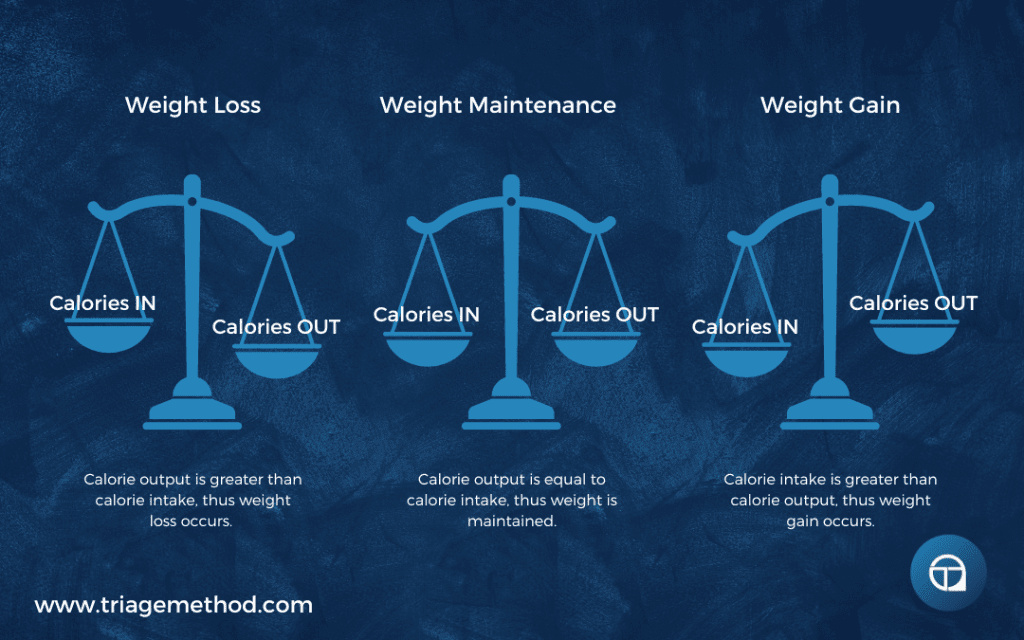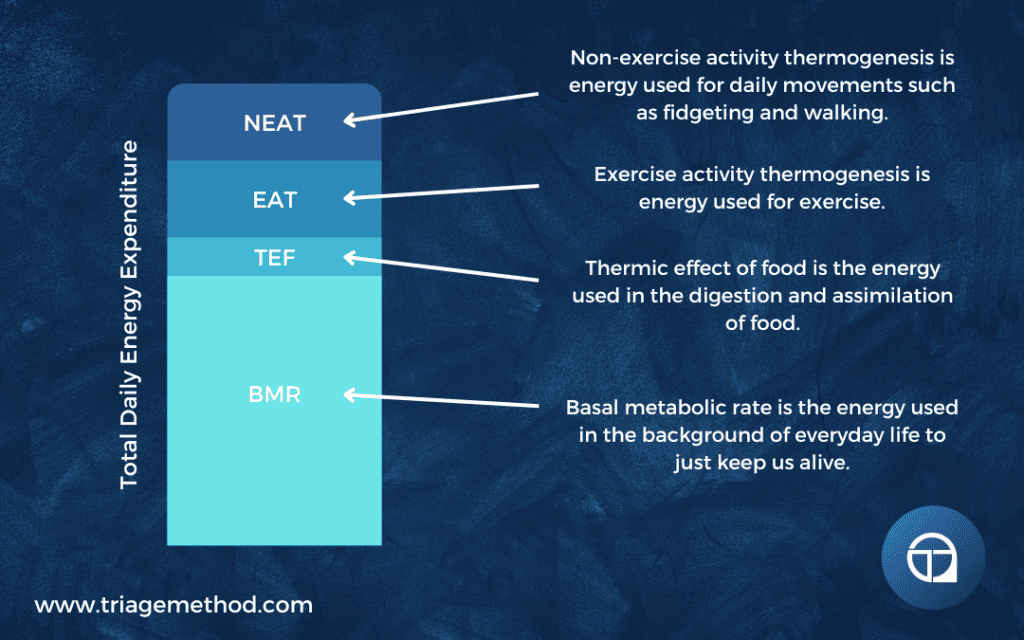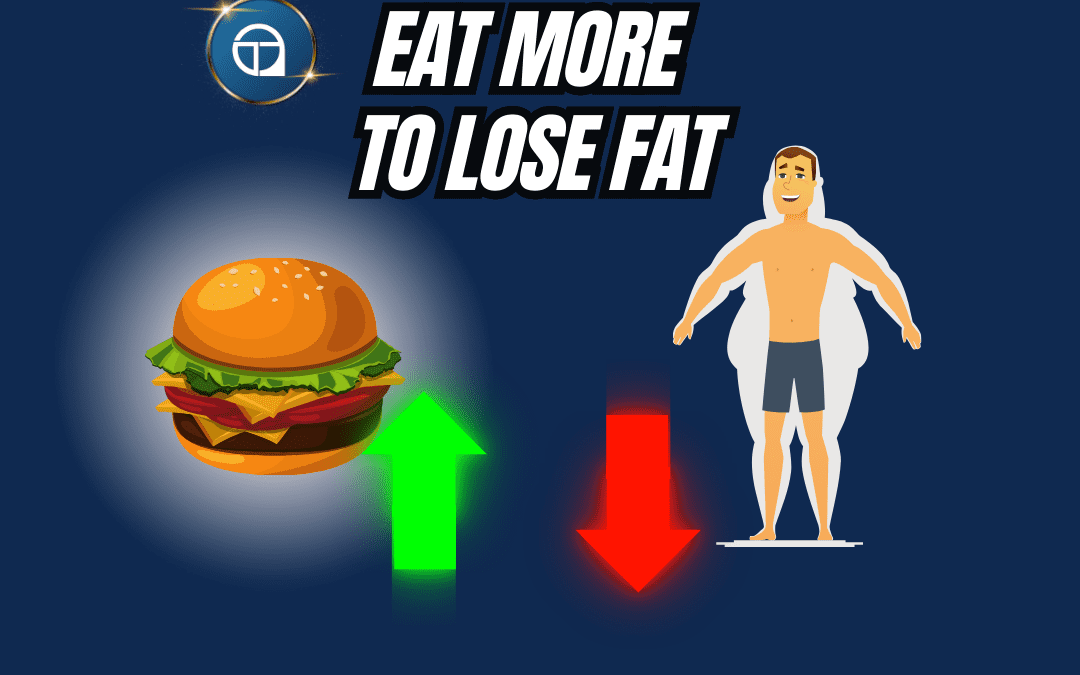In this article, we are going to explore how to eat more to lose fat. Many dieters find the concept of being able to eat more to lose fat akin to the Holy Grail, and it is because of this that a lot of trainers, coaches, and nutritionists online will use it as a marketing tool to sell their services. They’ll promise you that, ‘You can eat more with my training, my nutrition, etc., and still get the results that you want,’ which for someone who is eating fewer calories than they would ideally like, it sounds like heaven. The reality is that it is actually possible to eat more and lose fat, and there is a physiological basis to it. It isn’t all just marketing.
The unfortunate reality is that when there is a physiological basis to the discussion, it is very easy for marketing to get ahead of the physiology and to end up promising more than is actually possible. Having coached a lot of people, I have heard many stories where people are sold the dream, but the reality is much different than what they were sold. As a consumer, and potentially someone who is not an expert in all this health and fitness stuff, when someone promises you that they can show you the secrets to eating more and still losing fat, you are kind of being deceived because it’s nothing magic, and while people make it out as if they have these super secret hacks, tips, and tricks, that allows them to get phenomenal results with their clients, the reality is that they are still following the same basic rules of setting up a well balanced and results producing diet. They aren’t doing anything magical, they are just setting things up how they should have been set up in the first place, or they are just lying to you and claiming they have the secrets that no one else has. Believe me, if there were super secret, highly effective methods, we would be teaching them to coaches in our Nutrition Coaching Certification course.
Eat More To Lose Fat
Calorie Balance
So how is it possible to eat more to lose fat?
Most of you have probably heard by now of this ‘calories in, calories out’ discussion, where you want to balance the calories you’re eating with the calories you’re outputting in terms of exercise, movement, etc. You want to balance the equation so that if fat loss is the goal, you are burning more calories or consuming fewer calories. You want to be in a calorie deficit. You want to create a deficit of energy, whether it’s through extra movement or less food coming in or a combination of both.

With that in mind, you may be thinking that it is impossible to eat more to lose fat. Surely that violates the calories in, calories out equation?
The reality is, there is a more nuanced understanding of calorie balance that is needed to really understand how it is possible to eat more and lose fat. There are a lot of things that actually make up your metabolism that are affected both by what you do and also by what you consume.
It makes logical sense that if you were to create a bigger calorie deficit, you would lose more fat or potentially you would lose that fat faster, right? And it makes logical sense again, with the calories in, calories out equation in mind, that if you make an even bigger deficit, more fat loss/faster fat loss would occur.
However, this isn’t generally what happens in the real world.
What generally happens when you create this bigger calorie deficit is that people end up not being able to follow the diet and aren’t actually eating as big a calorie deficit as they thought they were, or they aren’t eating a calorie deficit at all!
You’re eating in a calorie deficit, and you’re thinking, ‘I can’t lose weight,’ but if someone was to look at your diet they would quickly be able to point out that you’re eating in a calorie deficit Monday to Friday, but then you’re starving come Saturday and Sunday, so you overconsume on those days, and as a result, your overall calories for the week ends up at maintenance or potentially even in a surplus.
So how does this relate to being able to eat more to lose fat?
Well if you were to actually eat more each day, and be in a less aggressive deficit Monday to Friday, you are going to be much less likely to overconsume on the weekend due to excessive hunger.
Boom. There’s the magic.
The magic is simply getting you to stick to the diet and consistently be in a calorie deficit.
But that’s not all there is to it. Let’s assume you were able to follow the diet across the week with no deviations, eating more may still lead to more fat loss.
Metabolic Adaptations To Dieting
When you are dieting to lose fat, and are consistently eating in a calorie deficit, your metabolism does become impacted by the fact that you are eating less.

First of all, the thermic effect of feeding (TEF) is reduced, so that’s the calories you burn just digesting your food, and that goes down because you’re simply eating less food. This isn’t a massive drop, but it does mean that you are burning fewer calories each day, so the “calories out” side of the equation is reduced slightly.
When dieting, you also see reductions in your body weight. This naturally enough means you burn fewer calories doing the same activities you were previously doing. When moving around, you are moving less weight, and thus burning fewer calories.
For example, if you weigh 100 kilos, you lose 10 kilos, you’re no longer weighing 100 kilos (duh), and you no longer have to carry around 100 kilos, you now have to carry around 90 kilos. So for the same given unit of activity, you’re burning fewer calories.
This does have some knock on effect on your basal metabolic rate (BMR), especially if the weight you lost is muscle. But I know you have all read our article on how to set up the diet effectively, and thus you aren’t going to be losing muscle, so this should be too much of a change overall. There are a few other adaptations that do occur to your BMR, and people like to focus excessively on these adaptations and discuss things like metabolic damage etc. but this generally isn’t where most people are seeing the biggest adaptations. In reality, the parts of your metabolism that get impacted the most in a calorie deficit are your exercise activity thermogenesis (EAT) and then your non-exercise activity thermogenesis (NEAT).
Both of those things go down when you’re dieting, unless you’re actively trying to keep them up. What often happens, is that someone has been dieting for a few weeks and now they are simply not burning as many calories with their training and they aren’t doing as much NEAT.
If you are eating in a calorie deficit, especially if it is very aggressive, you’re not going to have really productive training sessions, and you can take all the caffeine you like in the world, it’s still not going to make up for an excessive deficit of energy. You need fuel to actually push hard training.
When people have been dieting for a longer period of time, their non-exercise activity thermogenesis generally tends to go way down. Let’s say that at the start of the diet, you were doing 7,000 steps per day (a proxy marker for NEAT). It wouldn’t be unusual to see this drop down to 1,000 to 2,000 steps per day.
As a result of both of these, you are burning way fewer calories than you think you are, and as a result, you aren’t in as big of a deficit as you thought.
By adding more food, you are now able to actually fuel your training (thus burn more calories doing it) and your NEAT will also likely go up (thus you burn more calories). You are still in a deficit, you are eating more but you are also burning more calories. So the calories in calories out equation is still holding true.
Eat More To Lose Fat Conclusion
So there are the secrets that allow you to eat more and still lose fat. It won’t work for everyone, and it is only something that is possible for a certain segment of the dieting population, but it is something that understanding does actually help all dieters.
You now know how important it is to diet on as many calories as possible, while still getting results. You also know how important it is to fuel your training, even while trying to lose fat. You also know how important it is to track your daily steps, so you can keep NEAT in a good place. And you also now have a better understanding of metabolism and fat loss than the vast majority of people, and this will hopefully prevent you from falling victim to people trying to market to you about their super duper high calorie fat loss plan. You will also have a much better idea of how certain people you see on social media are able to stay lean, despite seemingly eating high calories (the reality is that they just have high calorie expenditure).
If this content is something that you resonate with, or if it is something you struggle with, as it is for a lot of our clients, then we might be able to help you on a one-to-one basis through our online coaching services. With coaching, we can look at your overall diet and help you come up with a comprehensive, science backed plan of action to help you get the results you are looking for.
If you want to learn how to set up a diet effectively you may be interested in our comprehensive diet set up article or our diet calculators (the ultimate diet set up calculator would be a good one if you already know how many calories you should be eating, alternatively our calorie and macronutrient calculator may be more beneficial if you don’t know how many calories you should be consuming for your goals).
We also teach people to become nutrition coaches on our nutrition coaching certification course, if you are a coach who wants to upskill or you are interested in learning how to actually coach someone to better nutrition. If you just want to learn more about all things health and fitness, then feel free to explore our free content and subscribe to our email newsletter. If you prefer visual content, then subscribe to our YouTube channel, X and Instagram.

